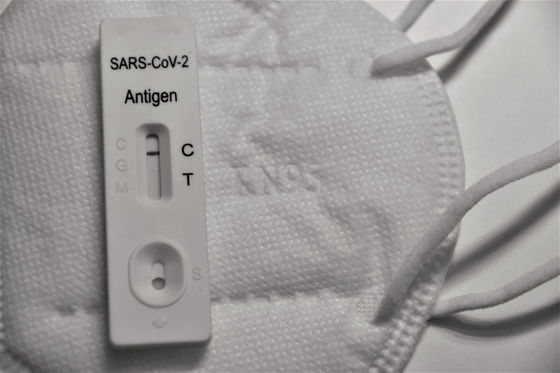Researchers say the impact of the aftereffects of the new corona is ``immeasurable''

A leading British research group scientifically analyzed research on the new coronavirus infection (COVID-19), and found that the burden of `` long COVID '', the sequelae of COVID-19, is `` immeasurably large '' for patients. ” says.
The immunology of long COVID | Nature Reviews Immunology
Prof Danny Altmann: the burden of long COVID | RNZ
https://www.rnz.co.nz/national/programmes/saturday/audio/2018899512/prof-danny-altmann-the-burden-of-long-covid

The long-term effects of COVID-19 were analyzed by Danny Altman, a professor of immunology at Imperial College London, a prestigious university in the United Kingdom. According to the research team, 10% of people who develop COVID-19 suffer from lasting sequelae, and up to 400 million people worldwide suffer from long-term COVID-19 and need help. I was.
The symptoms of long COVID are diverse, and symptoms such as shortness of breath, fatigue, wheezing , fatigue after exercise, and brain fog are particularly known. However, in fact, about 200 other symptoms are associated with long COVID, including decreased vocabulary, insomnia, skin rashes, and the onset of new allergies.
The study found that patients with long COVID showed signs of damage to the heart, lungs, brain, and nervous system, and signs of illness in the immune system. “My job in this research was to look hard at hard data, hard evidence, hard numbers for a really long time and try to come to some kind of consensus that I thought would work,” says Altman. I spoke.

The study by Professor Altman et al. is a cohort study that analyzes large-scale longitudinal survey data and examines the effects of long COVID. Since the patients who were the subjects of the research had undergone MRI examinations, physical examinations, cognitive function tests, etc. for several years, we were able to compare the data before and after COVID-19 infection.
Professor Altman said of the research results, ``The most terrifying answer was obtained. Part of the subject's brain had shrunk due to the effects of COVID-19, and the scores of cognitive function tests had also decreased due to the effects of COVID-19. This result may be very scary to people, but this is the reality we understand at this point.'
Also, symptoms associated with long-term COVID include autoimmune diseases (when the body's immune system attacks the body's own proteins), inflammation, blood clotting disorders, organ damage, viral persistence (viral reservoirs remain in the body), and blood clotting. They list a variety of things, including abnormalities, gas exchange and difficulty oxygenating the blood. About this, Professor Altman said, 'These symptoms do not have to be mutually exclusive.'
The research group believes that the virus may remain insidiously in many tissues in the body, especially in tissues with ACE2 to which the

``Post-exercise malaise'' (PEM), known as one of the sequelae of long COVID, seems to occur even after a small amount of exercise. PEM is a feeling of fatigue that occurs even if you move your body just a little, and it seems that it takes a surprisingly long time to recover. Another problem with PEM is that it is difficult for people who have never experienced PEM to understand the seriousness of the situation.
The study also showed that vaccination is effective and important in reducing long-term chances of contracting COVID-19. Professor Altman said, ``The new coronavirus vaccine is an amazing miracle, it works very well, and it has saved the planet from a terrible situation. What would the mortality and economic impact of COVID-19 be without the vaccine? 'Nobody knows. The vaccine worked very well.'
He added, 'The best way to avoid long-term exposure to COVID-19 is to not get infected with the new coronavirus. It is to have a sufficient level of antibody to stop it, ”he said, talking about the importance of vaccines.
Professor Altman acknowledged that some people who were vaccinated developed COVID-19 or developed long COVID, but said, ``By receiving the vaccine, the incidence of long COVID is 50%. We won't be completely free from the danger of long-term COVID-19, but it will definitely reduce the incidence.'

In addition, the existence of diseases with biomarkers similar to long COVID was also revealed. Professor Altman is particularly interested in myalgic encephalomyelitis/chronic fatigue syndrome (ME/CFS) . ME/CFS has many similar physical manifestations, and postsymptomatic PEM has also been reported. According to research, ``same blood biomarkers'' and ``changes inintestinal flora '' have been confirmed in both long COVID and ME/CFS. Some other similarities have also been identified between long COVID and multiple sclerosis (MS).
However, 'there are no studies that can confidently explain' how these biomarkers are related to long-COVID symptoms, explained Professor Altman.
And given the wide range of symptoms identified in Long COVID, potential treatments may work for some patient populations but not for others, says Altman. Professor explained.
“Some people may be helped by antiviral drugs, some may be helped by anticoagulants, some may be helped by specific autoimmune suppression. Even if you try to put it in one pot and treat it in the same way, you can't solve the mystery, so you need to analyze it carefully.'
Related Posts:
in Science, Posted by logu_ii







